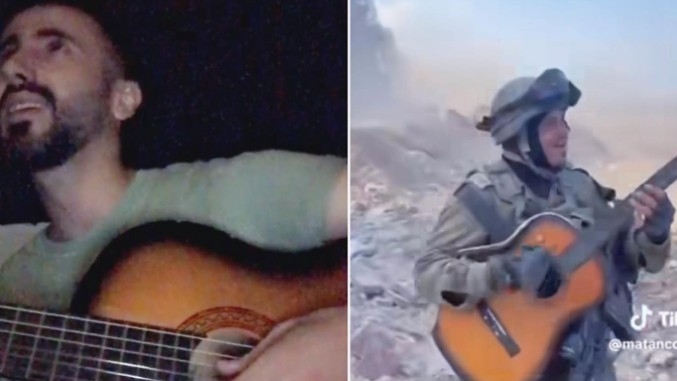Israel-Palestine war: Displaced Gaza singer felt 'helpless' as Israeli soldier played his guitar on rubble of home

Palestinian musician Hamada Nasrallah spoke of his disbelief last week when he watched an Israeli soldier on TikTok playing his guitar amid the rubble of his demolished home in northern Gaza.
“It was jarring,” the 28-year-old singer, composer and songwriter told Middle East Eye.
The guitar, which his late father gifted to him 15 years ago, was one of the precious belongings he was unable to carry during his forced displacement to the south of Gaza.
Like more than a million Palestinians who were forced to evacuate their homes in the north of Gaza during the early days of the Israeli onslaught that started on 7 October, Nasrallah and his family have been seeking shelter in different places in the south in an attempt to escape from the ferocious aerial bombardment of civilian homes and infrastructure.
“My dad died shortly after the 2014 attack on Gaza, and now they have come to take the last souvenir I have from him,” he wrote on Instagram.
New MEE newsletter: Jerusalem Dispatch
Sign up to get the latest insights and analysis on Israel-Palestine, alongside Turkey Unpacked and other MEE newsletters
“Isn't it enough that they take away our loved ones, our homes, our families, and even our music and memories? Where does the injustice stop?!” he added.
Currently Nasrallah is seeking shelter in Deir al Balah, south of Gaza City, along with two members of his Sol Band. His family are sheltering at the Nuseirat refugee camp with other relatives.
Before leaving his home in the Sudaniya neighbourhood, he said he left his guitar "with a heavy heart".
"When I initially shared my passion for music with my family, my father wholeheartedly supported me by gifting me a guitar. I only grasped its true significance later," he told MEE.
Nasrallah said he was not planning to leave the guitar behind when he and his family had to flee their home. He said he packed a limited set of belongings into a well-worn backpack, tightly holding onto the guitar. Eventually, however, he left it behind, "I believe if Israeli soldiers discovered it, it would undoubtedly be taken. Its distinctive appearance could pose a risk for me."
But in that vulnerable moment of fleeing for their lives, Nasrallah and his family had to prioritise which belongings to take.
"The city is being devastated, and the people for whom we sing and play music are being killed. Who should we sing for now?” he told MEE.
Nasrallah saw the soldier's video the day after his arrival in Deir al Balah.
“For a moment, I felt hopeless, helpless and vulnerable as I could not defend my belongings," he said.
Nasrallah's Sol Band, named after the fifth note of a sung musical scale, is a group of six Palestinian musicians who dedicated themselves to both modern and traditional Arabic and Palestinian music.
Before the outbreak of the conflict, the band had toured globally, showcasing their talent in countries such as Jordan, Egypt, Belgium, and France. Despite being based abroad for over three years, they made the decision to return to Gaza just before the hostilities in October.
"I came back in October to spend some quality time with my family. My plan was to extend my stay, record songs, albums and videos in Gaza, and we were scheduled to travel outside Gaza in early November," said Nasrallah.
On 31 October, amidst the ongoing war, the band released a new song titled Let the Tongue Start Mourning, a composition created and recorded during the conflict.
Middle East Eye delivers independent and unrivalled coverage and analysis of the Middle East, North Africa and beyond. To learn more about republishing this content and the associated fees, please fill out this form. More about MEE can be found here.





